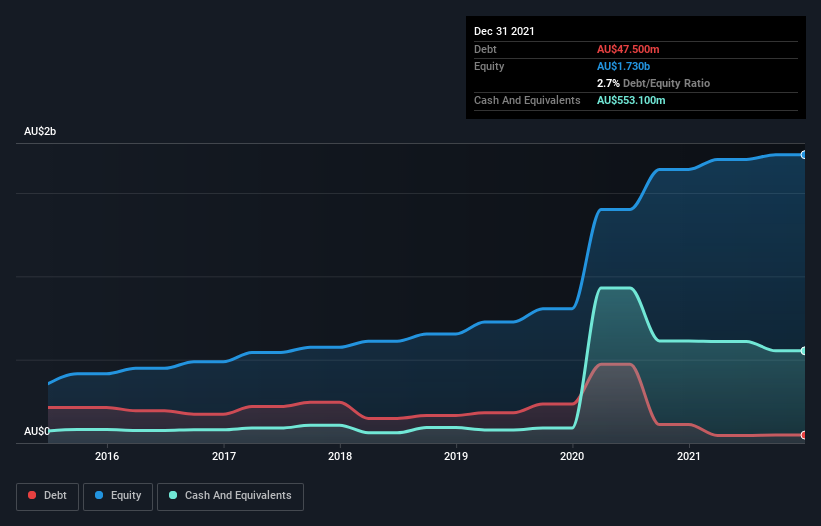Cochlear (ASX:COH) Has A Pretty Healthy Balance Sheet
Legendary fund manager Li Lu (who Charlie Munger backed) once said, 'The biggest investment risk is not the volatility of prices, but whether you will suffer a permanent loss of capital.' When we think about how risky a company is, we always like to look at its use of debt, since debt overload can lead to ruin. We can see that Cochlear Limited (ASX:COH) does use debt in its business. But is this debt a concern to shareholders?
When Is Debt Dangerous?
Debt and other liabilities become risky for a business when it cannot easily fulfill those obligations, either with free cash flow or by raising capital at an attractive price. Part and parcel of capitalism is the process of 'creative destruction' where failed businesses are mercilessly liquidated by their bankers. However, a more common (but still painful) scenario is that it has to raise new equity capital at a low price, thus permanently diluting shareholders. Of course, the upside of debt is that it often represents cheap capital, especially when it replaces dilution in a company with the ability to reinvest at high rates of return. When we think about a company's use of debt, we first look at cash and debt together.
See our latest analysis for Cochlear
How Much Debt Does Cochlear Carry?
As you can see below, Cochlear had AU$47.5m of debt at December 2021, down from AU$110.8m a year prior. However, it does have AU$553.1m in cash offsetting this, leading to net cash of AU$505.6m.
How Healthy Is Cochlear's Balance Sheet?
According to the last reported balance sheet, Cochlear had liabilities of AU$377.6m due within 12 months, and liabilities of AU$324.6m due beyond 12 months. Offsetting this, it had AU$553.1m in cash and AU$367.8m in receivables that were due within 12 months. So it can boast AU$218.7m more liquid assets than total liabilities.
This state of affairs indicates that Cochlear's balance sheet looks quite solid, as its total liabilities are just about equal to its liquid assets. So while it's hard to imagine that the AU$15.5b company is struggling for cash, we still think it's worth monitoring its balance sheet. Simply put, the fact that Cochlear has more cash than debt is arguably a good indication that it can manage its debt safely.
On top of that, Cochlear grew its EBIT by 70% over the last twelve months, and that growth will make it easier to handle its debt. The balance sheet is clearly the area to focus on when you are analysing debt. But ultimately the future profitability of the business will decide if Cochlear can strengthen its balance sheet over time. So if you want to see what the professionals think, you might find this free report on analyst profit forecasts to be interesting.
Finally, a business needs free cash flow to pay off debt; accounting profits just don't cut it. Cochlear may have net cash on the balance sheet, but it is still interesting to look at how well the business converts its earnings before interest and tax (EBIT) to free cash flow, because that will influence both its need for, and its capacity to manage debt. Over the last three years, Cochlear reported free cash flow worth 6.0% of its EBIT, which is really quite low. That limp level of cash conversion undermines its ability to manage and pay down debt.
Summing up
While it is always sensible to investigate a company's debt, in this case Cochlear has AU$505.6m in net cash and a decent-looking balance sheet. And we liked the look of last year's 70% year-on-year EBIT growth. So we don't think Cochlear's use of debt is risky. Over time, share prices tend to follow earnings per share, so if you're interested in Cochlear, you may well want to click here to check an interactive graph of its earnings per share history.
If you're interested in investing in businesses that can grow profits without the burden of debt, then check out this free list of growing businesses that have net cash on the balance sheet.
Have feedback on this article? Concerned about the content? Get in touch with us directly. Alternatively, email editorial-team (at) simplywallst.com.
This article by Simply Wall St is general in nature. We provide commentary based on historical data and analyst forecasts only using an unbiased methodology and our articles are not intended to be financial advice. It does not constitute a recommendation to buy or sell any stock, and does not take account of your objectives, or your financial situation. We aim to bring you long-term focused analysis driven by fundamental data. Note that our analysis may not factor in the latest price-sensitive company announcements or qualitative material. Simply Wall St has no position in any stocks mentioned.

 Yahoo Finance
Yahoo Finance 
